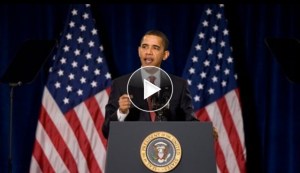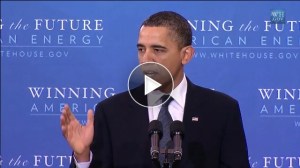On April 14, 2009, President Obama delivered arguably the most important domestic speech of his first year in office at Georgetown University, laying out his grand vision for repairing the U.S. economy. “We must lay a new foundation for growth and prosperity,” he declared, before laying out the “five pillars” of his plan. Chances are you don’t remember anything about it, or even the phrase “new foundation.” The speech looked like this:
On Wednesday, Obama returned to Georgetown for a major address laying out his new vision for energy security. The speech looked like this. Notice a difference?
Now the overwhelming majority of Americans neither saw nor read either speech, but tens of millions would have seen passing glances of both on television. In the first speech, they would have seen a President speaking before flags. In the second, they would have seen a president “Winning The Future.”
This change is a direct result of a newly retrofitted White House communications operation, with David Plouffe, Obama’s 2008 campaign manager, running the show. “A huge value has been placed on precision and repetition of language, in terms of we know what our message is, and we repeat it and repeat it,” one senior administration official tells me. “The whole new communications structure was designed to have greater discipline and stronger message consistency.”
That is why Obama has been saying some variation of the phrase “win the future” almost every day since this year’s State of the Union address, no matter what else–Arab uprisings, Japanese earthquake, new foreign air invasions–has been going on. It is an interesting thought experiment to think about how the first two years might have been different for Obama had his team embraced this sort of campaign-style discipline from the start. Chances are you would still remember the phrase “new foundation,” and more Americans may have thought the President had a plan for solving the nation’s economic woes when the walked into their polling places last November.



